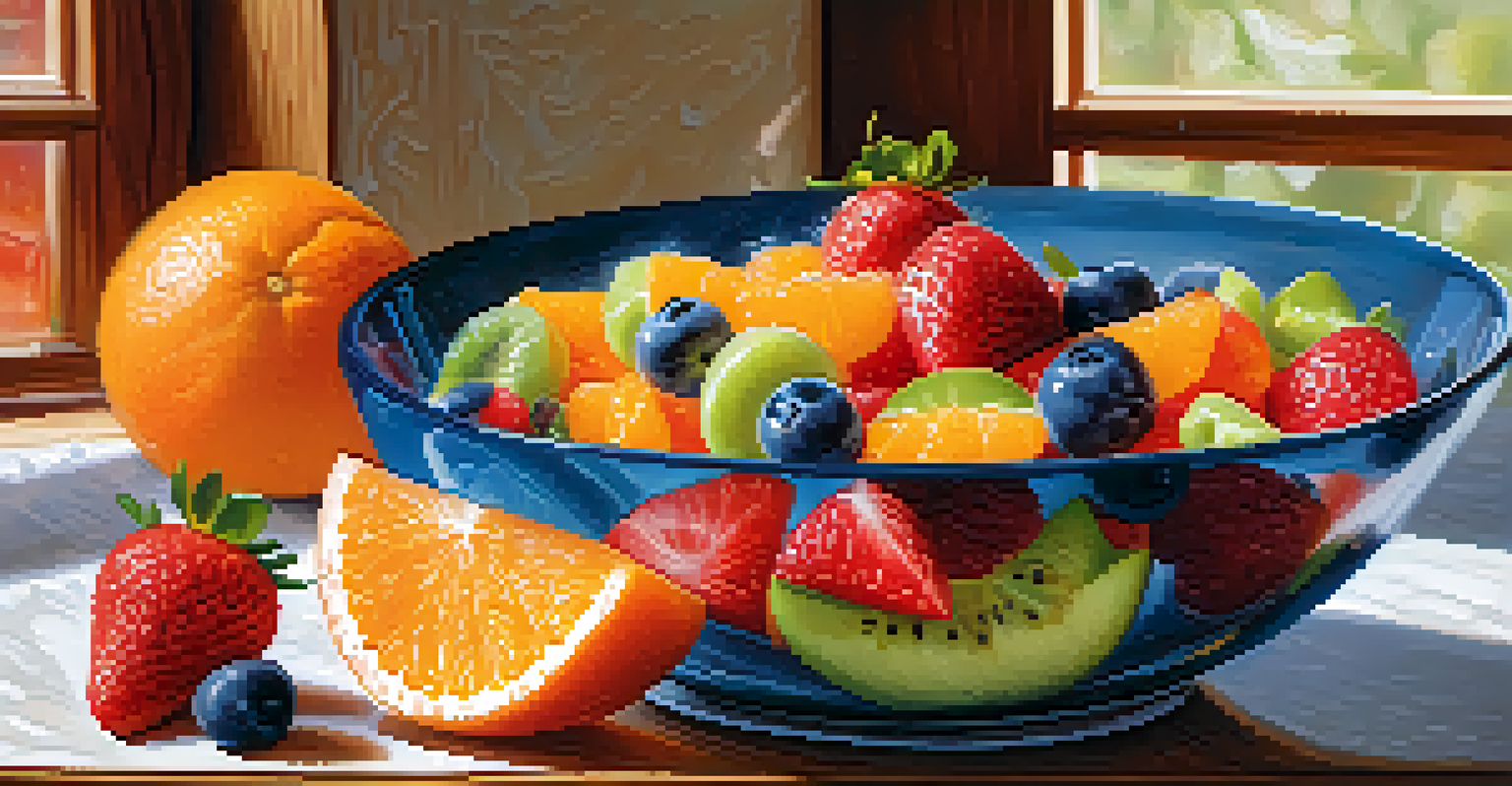The Importance of Hydration for Aging Gracefully and Healthily

Understanding Hydration and Its Role in Aging
Hydration is more than just drinking water; it's about maintaining the right balance of fluids in your body. As we age, our bodies become less efficient at signaling thirst, which can lead to dehydration. This is particularly concerning since each cell in our body relies on water to function optimally.
Water is the driving force of all nature.
Imagine your body as a well-tuned engine; without sufficient coolant, it can overheat and malfunction. Similarly, without adequate hydration, our bodily functions—like digestion, circulation, and temperature regulation—can falter. Ensuring proper hydration is a fundamental step toward promoting overall health as we grow older.
Additionally, staying hydrated can enhance skin elasticity, combat fatigue, and improve cognitive functions. In essence, water is a key player in the game of healthy aging, helping you feel and look your best.
Signs of Dehydration in Older Adults
Recognizing dehydration is crucial, especially for older adults who might not feel thirsty as often. Common signs include dry mouth, fatigue, confusion, and dark-colored urine. It's easy to overlook these symptoms, but they are signals from your body that it needs more fluids.

Picture your body as a garden; without regular watering, the plants wilt and lose their vibrancy. Dehydration can similarly sap your energy and vitality. Therefore, it's essential to be proactive and monitor your fluid intake, especially as you age.
If you notice any signs of dehydration, it's vital to take action. Increasing your water intake and consuming hydrating foods, like fruits and vegetables, can make a significant difference in how you feel and function daily.
The Benefits of Staying Hydrated
Maintaining good hydration levels offers numerous benefits that contribute to aging gracefully. For instance, proper hydration supports joint health by lubricating cartilage, which can alleviate stiffness and discomfort. This is especially important for staying active and mobile as you age.
The body is your temple. Keep it pure and clean for the soul to reside in.
Think of your joints as hinges on a door; without sufficient oil, they can become creaky and hard to move. Hydration acts as that oil, ensuring your joints remain flexible and functional. Staying well-hydrated can also aid in digestion, helping your body absorb nutrients more effectively.
Moreover, hydration plays a significant role in cognitive function. Studies suggest that even mild dehydration can impact concentration and memory, making it crucial to drink enough fluids for mental clarity and focus.
How Much Water Do You Need as You Age?
The amount of water needed can vary based on factors like activity level, climate, and overall health. A common recommendation is to drink at least eight 8-ounce glasses of water a day, but this can be adjusted based on individual needs. Older adults may require even more if they are active or live in a hot climate.
Think of it as tuning an instrument; you need to find the right balance that works for your body. A good way to gauge your hydration is to listen to your body and monitor the color of your urine—light yellow typically indicates good hydration.
Don't wait until you're thirsty to drink. Make it a habit to sip water throughout the day, and consider carrying a reusable water bottle as a reminder to stay hydrated.
Hydrating Foods to Include in Your Diet
In addition to drinking water, incorporating hydrating foods into your diet can significantly boost your fluid intake. Foods like cucumbers, watermelon, oranges, and strawberries are not only delicious but also packed with water. These snacks can help keep you hydrated while providing essential vitamins and nutrients.
Imagine filling your plate with colorful fruits and vegetables; each bite not only contributes to hydration but also offers a range of health benefits. For instance, cucumbers are about 95% water and are low in calories, making them an excellent choice for hydration without excess calories.
Including soups and broths in your meals can also be a tasty and effective way to increase hydration. These warm dishes can be comforting and nutritious, especially during colder months when you might not feel as thirsty.
Tips for Staying Hydrated Throughout the Day
Making hydration a part of your daily routine can be simple and enjoyable. Start your day with a glass of water as soon as you wake up; this helps kickstart your metabolism and hydrate your body after a night's rest. Setting reminders on your phone can also encourage you to drink water at regular intervals.
Another effective tip is to associate drinking water with certain activities. For example, drink a glass of water before each meal or after every bathroom visit. This creates a positive habit that can help you meet your hydration goals effortlessly.
Lastly, consider exploring flavored water options if plain water doesn't excite you. Infusing water with fruits, herbs, or even a splash of citrus can make hydration feel more like a treat than a chore.
The Connection Between Hydration and Longevity
Research indicates a strong link between proper hydration and longevity. Studies have shown that individuals who maintain adequate hydration levels tend to have lower risks of chronic diseases, such as kidney stones, urinary tract infections, and even certain cancers. This suggests that staying hydrated can be a vital component of a healthy lifestyle.
Think of hydration as a protective shield; the more you invest in it, the better your chances of deflecting potential health issues. By making hydration a priority, you're not just enhancing your daily wellbeing but also paving the way for a healthier future.

Ultimately, embracing hydration as part of your daily routine can lead to a more vibrant, fulfilling life as you age. It’s not just about longevity; it’s about enjoying each moment with energy and vitality.